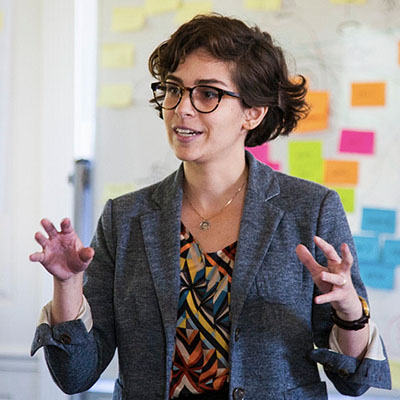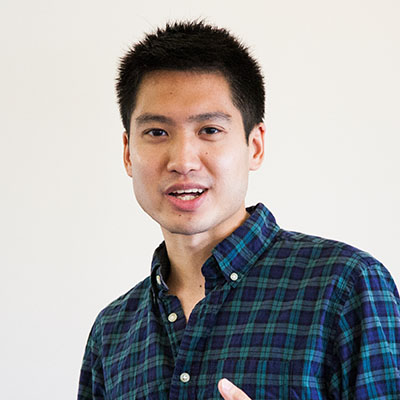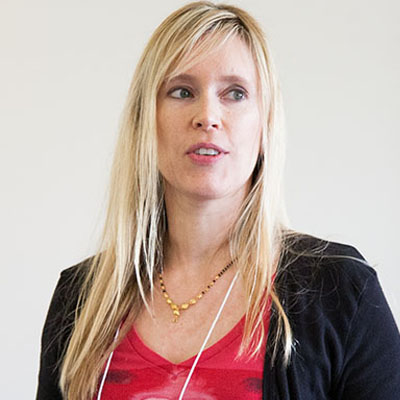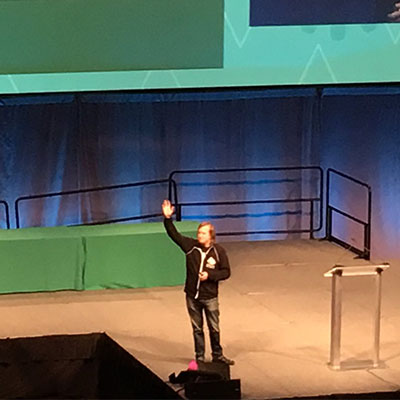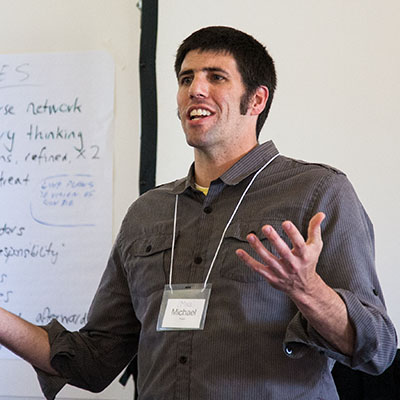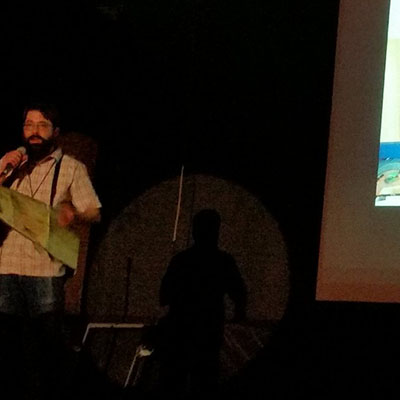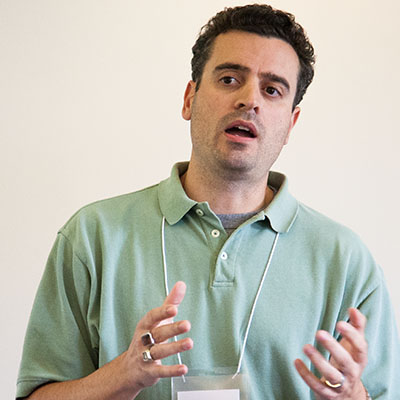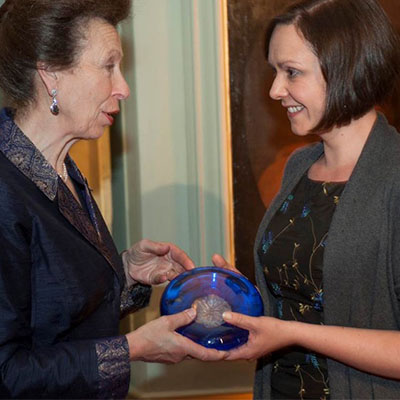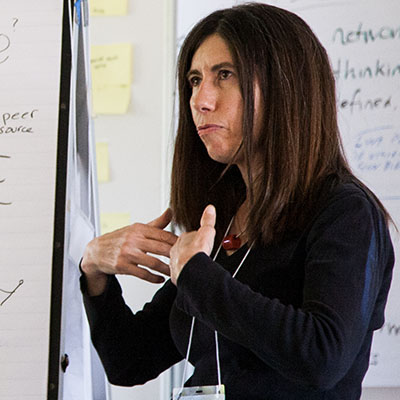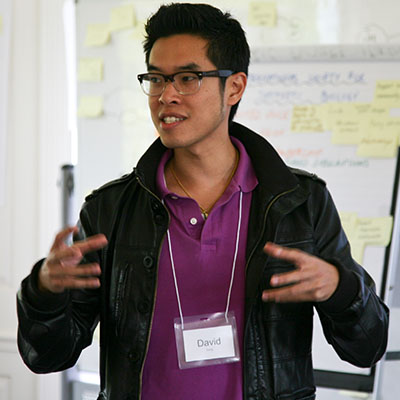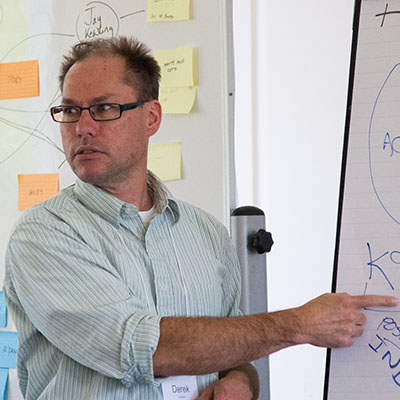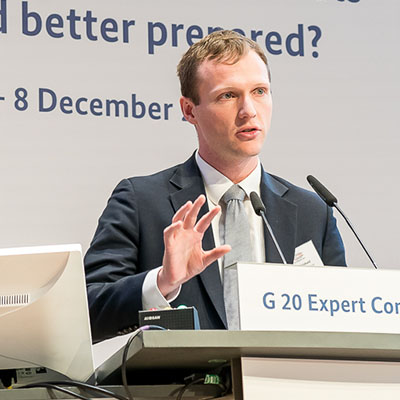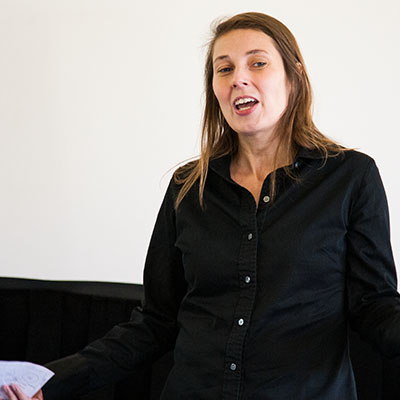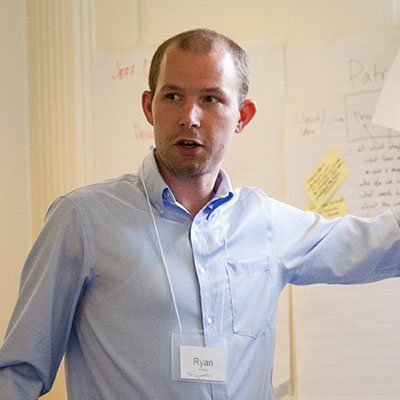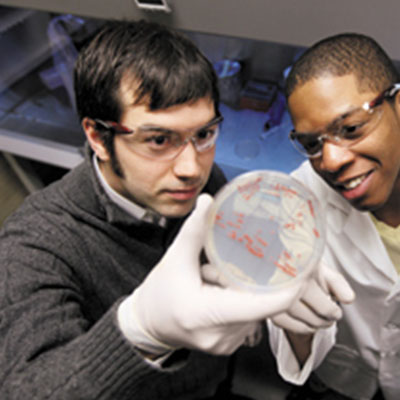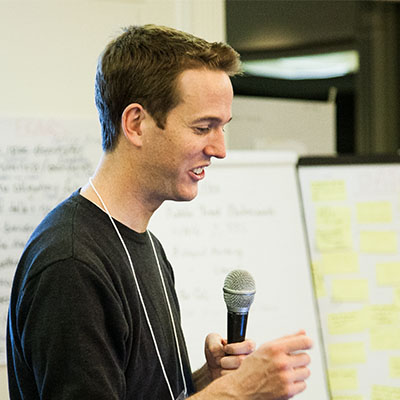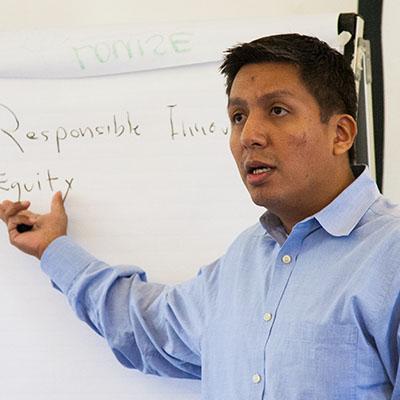2015 Fellows
The LEAP Fellows are emerging leaders competitively selected for their leadership potential and their visions for shaping the future of biotechnology in the public interest.
Afke (Wieke) Betten
Afke (Wieke) Betten is a PhD candidate and lecturer at the Athena Institute at the VU University of Amsterdam, the Netherlands. Her main (research) interests include bioethics, sociology of science and technology, and transdisciplinary research. Wieke’s PhD project aims to contribute to responsible innovationof synthetic biology by facilitating learning processes between different stakeholders (such as citizens, students, artists and researchers) and exploring their individual and collective sense-making. She also co-organizes events for the Open Wetlab at Waag Society Amsterdam. Since 2011, Wieke has been involved in the iGEM competition, both as an advisor and a judge. She was recently involved in the SYNENERGENE project, collaborating withiGEM teams in “real-time” technology assessments. Wieke obtained an MSc in medicine and an MSc in management, policy analysis and entrepreneurship in the Health and Life Sciences, both from the VU University in Amsterdam. In 2015, she finished her training program at The Netherlands Graduate Research School of Science, Technology and Modern Culture (WTMC).
Mac Cowell
Mac Cowell is a biotechnologist working on low-cost molecular biology tools. Previously, Mac worked for the International Genetically Engineered Machine (iGEM) competition at MIT; co-founded DIYbio.org, an online community for biotechnologists; started BOSSlab.org, a public wetlab in Somerville, MA; and researched patent use in the genetic diagnostic industry at the Berkman Center at Harvard University. In 2011, he co-founded Cofactor Bio and developed an innovative $25 PCR + DNA sequencing reagent kit for consumers and educators. Currently, Cowell works at Genefoo LLC, an R&D lab in San Francisco, CA, which is focused on developing and sourcing low-cost, open source molecular biology equipment. Most recently, Genefoo developed an innovative Synthetic Biology exhibit at the San Jose Tech Museum of Innovation that involved hands-on transformation and measurement of a three-color reporter system. Cowell has a BS in biology from Davidson College.
Camille Delebecque
Camille Delebecque is an entrepreneur and biotechnologist. He is passionate about taming wild microbes to do great things, running on big mountains for long times, and very good sustainable food. Camille is an advocate of using biology as technology and has been working on fostering biotechnological innovations with organizations across the private, public and social sectors. He is the founder and CEO of SynBio Consulting and an advisor in Synthetic Biology for the European Commission. His latest venture, Afineur, crafts better and more sustainable food using disruptive fermentations. Prior to founding Afineur and SynBio Consulting, Camille worked at Puretech Ventures, consulted for the Harvard Office of Technology Development, and worked for the Life Science division of UNESCO. Camille is trained as a bioengineer and earned his PhD in synthetic biology with the highest distinctions between Harvard and Paris University. His thesis work has been published in leading scientific journals and made the cover of Science.
Kim de Mora
Kim de Mora is the judging coordinator and director of development for the iGEM Foundation. After beginning his career in engineering, Kim received his PhD in synthetic biology from the University of Edinburgh. During this time, Kim was awarded the Lessels Scholarship from the Royal Society of Edinburgh to spend a year working on yeast synthetic biology at Harvard Medical School under the guidance of Professor Pam Silver. He was also a member of the first iGEM team from Scotland, developing a functional arsenic biosensor that won the inaugural “Best Real World Application” prize. This project set the tone at iGEM for years to come and now many teams seek to solve local challenges that remain unaddressed in their communities. After a decade in synthetic biology, Kim now runs the judging program at the iGEM foundation and has recruited over 1,000 senior members of the community to participate in Jamborees worldwide. He also manages development and builds partnerships with organizations and sponsors to engage with the iGEM Foundation’s 30,000+ member community.
Connor Dickie
Connor Dickie co-founded Synbiota Inc. to accelerate biotechnology R&D. Synbiota is a rapid prototyping software/wetware platform for synthetic biology that puts the power of life into the hands of enthusiasts and researchers around the globe. Connor is a former student of the MIT Media Lab, where he created context-sensitive and attention-aware computers that have since been commercialized by Samsung. Connor is an alumnus of Mozilla’s WebFWD program, and winner of the 2014 SXSW Interactive Accelerator. Connor is also a co-founder of DIYBio communities in Toronto and Montreal.
Kevin Esvelt
Kevin Esvelt is an assistant professor and leader of the Sculpting Evolution Group at the MIT Media Lab, Kevin Esvelt studies ways of using molecular tools to alter populations and ecosystems. He received his PhD from Harvard University for inventing PACE, a synthetic microbial ecosystem for rapidly evolving useful biomolecules. At Wyss Institute, he helped pioneer the development of a powerful new method of genome engineering based on CRISPR/Cas9, an enzyme that can cut DNA at almost any desired sequence. Kevin outlined how CRISPR might be used to alter wild populations of sexually reproducing organisms by building evolutionarily stable “gene drives.” Kevin is deeply concerned with ensuring that research involving gene drives and other shared-impact technologies is open and responsive. In addition to devising novel solutions to evolutionary problems, his work at the Media Lab focuses on inventing and stress-testing technologies that will empower local communities to make decisions about their own environments.
James Field
James Field is CEO and co-founder of LabGenius, a synthetic biology startup based in London, UK. LabGenius was conceived during James’s PhD studies at Imperial College London, where his research was focused on re-engineering protein nanocages for biotechnological applications. Prior to his PhD, James completed a BSc in biology with microbiology (1st Class) and an MRes in systems and synthetic biology (Distinction) at Imperial College London. James is an active member of the synthetic biology community and has participated in the iGEM competition both as an undergraduate (2009) and an advisor (2011).
Ted Fjällman
Ted Fjällmanis CEO of Prokarium, a UK SynBio company that has transformed Salmonella into a SynBio tool for oral delivery and production of vaccines from within the body’s own immune cells—a technology currently in clinical trials. Ted has a wide international background, earning his degrees on three different continents. During his PhD in Canada, he developed a method to bind toxins in filter paper using genetically modified antibodies. Afterward, Ted worked for one of Sweden’s leading think tanks where he coordinated the writing of a national innovation strategy for the Minister of Enterprise and organized delegation visits with prime ministers and top industry leaders. In 2009, he was one of 45 European astronaut finalists, and the last Swedish candidate out of 8,300 European applicants. He also co-founded Tekiu and Citizens without Borders, and when he has spare time enjoys learning languages, playing strategy games and rock climbing.
Keira Havens
Keira Havens is a synthetic-biologist-turned-entrepreneur dedicated to making biotechnology beautiful and accessible. She is currently the director of the One Sky Initiative, an independent voice dedicated to impact assessment of applied biology. This initiative, which asks the question “How do we apply biology well?”, grew out of an effort to bridge the gap between the perceptions, potential and reality of plant genetic engineering, starting with flowers that change color throughout the day. Revolution Bioengineering now works with artists, bioethicists, engineers and scientists to introduce the potential and possibility of synthetic biology through these flowers. After receiving a bachelor’s degree in molecular biophysics and biochemistry from the Illinois Institute of Technology in 2004, Havens accepted a commission in the United States Air Force. She left active duty to pursue a degree in a synthetic biology laboratory and received an MS from Colorado State University in 2014.
Andrew Herr
Andrew Herr is the CEO of Helicase, a leader in human performance enhancement. Helicase leverages cutting-edge science and technology to enhance mental and physical performance. Helicase also conducts groundbreaking research and development to push the frontiers of the field through its Mind Plus Matter division. To give back, Andrew teaches and conducts research as an adjunct professor of security studies at Georgetown University, as an adjunct fellow at the Center for a New American Security, and as co-director of the Herr Hands-On Learning Award program also at Georgetown. Prior to his current positions, Andrew led efforts on the future of human performance and biotechnology for the US Department of Defense. Andrew received master’s degrees in health physics, microbiology and immunology, and security studies from Georgetown University, along with his bachelor’s in science, technology and international affairs and a certificate in Eurasian, Russian, and East European studies.
Karen Ingram
Karen Ingramis a creative director, designer and artist who uses her skill set to promote scientific awareness. Karen co-authored Biobuilder: Synthetic Biology in the Lab (O’Reilly, 2015), a synthetic biology curriculum. She also served as a design track judge at IGEM in 2015. For more than four years, she has co-organized Brooklyn-based science cabaret The Empiricist League. She is a long-time planning committee member of SXSW Interactive, where she focuses on the overlap of science and art, emerging biotechnologies, and their effects on society. She is also a creative strategy instructor for NYU SHERP’s Entrepreneurial Science Journalism course. A veteran in the world of digital design, advertising and marketing, Ingram has worked at Campfire, McCann Erikson and UNICEF, to name a few. Her work has appeared in many publications, including titles from Die Gestalten, Scientific American, and The FWA, where she was named a “Digital Pioneer.” Ingram has written tutorials on digital design for Computer Arts magazine and New Riders publications. She has presented her work globally in venues such as Synbiobeta, the AIGA, Flash in the Can, Biofabricate, Synberc, and SXSW.
Jason Kakoyiannis
Jason Kakoyiannis is Business Development Director at Ginkgo Bioworks and founder of Bioscentric, a consultancy at the nexus of synthetic biology, technology and ingredients made by the fragrance, flavor, food and cosmetic industries. He has held strategic and creative roles in the global fragrance industry developing both business-to-business and consumer-facing platforms for companies such as Givaudan, Natura, Procter & Gamble and the Estée Lauder Companies, among others. Jason’s expertise straddles creative and executive roles and he is passionate about sensory experience, consumer engagement, and messaging around products that come from biology.
Cameron Keys
Cameron Keys is a Presidential Management Fellow in the US Department of Defense. He evaluates defense laboratory management practices for the Laboratories Office of the Assistant Secretary of Defense (Research and Engineering) and performs financial management analyses of logistics operations for US Army Headquarters (G-4). He is an Army Logistics University-Certified Operations Researcher/Systems Analyst and Lean Six Sigma Green Belt. Cameron studied biotechnology law while earning a master’s degree in science and technology policy from Arizona State University. His master’s thesis focused on designing and testing R&D management policies that incentivize social business model innovation. He performed ethnographic research at Japanese Materials Science laboratories for the Center for Nanotechnology in Society at ASU upon graduation, which led to projects in documentary film, moderated public debate, broadcast journalism and an art exhibition. Throughout this period, Cameron wrote about grassroots cultural responses to converging technologies as a journalist with the Prevail Project at the Sandra Day O’Connor College of Law at ASU.
Michael Koeris
Michael Koeris is the CEO and co-founder of Sample6, a hybrid wetware/software startup leveraging synthetic biology and Big Data approaches to improve the health and safety of global consumers. Sample6 is developing leading-edge solutions for food safety, coupled with the world’s fastest pathogen testing to detect harmful and unwanted bacteria in the food, healthcare and other industries. Michael also co-founded the nonprofit BiotechStart.org to facilitate the dissemination of successful business models for biotech startups, increase awareness among prospective founders, and help start more biotech companies. Before starting Sample6 and BiotechStart, Michael completed doctoral work on network approaches to combat antibiotic-tolerant bacteria with Professor James Collins at the Howard Hughes Medical Institute and Boston University. Michael remains a visiting scholar with the Synthetic Biology Group at MIT. He also sits on the boards of both nonprofit (AddGene) and for-profit companies (Xeno Bio). Mike graduated with an MS in biochemistry from the Free University of Berlin and was a recipient of the German Academic Exchange Fellowship (DAAD) to study at MIT. In addition to his scientific work, Mike previously worked at KPMG Consulting and McKinsey & Company in Germany, as well as Flagship Ventures in Cambridge.
Jon Marles-Wright
Jon Marles-Wright is a senior lecturer in microbial biotechnology in the School of Biology, Newcastle University. Prior to this appointment, he was a Chancellor’s Fellow in the Institute for Quantitative Biology, Biochemistry and Biotechnology, and Centre for Synthetic and Systems Biology at the University of Edinburgh. He trained as a biochemist and structural biologist, working on diverse projects including immune recognition of bacterial lipids, environmental sensors in Gram positive bacteria and plant cell wall degradation. His current research employs structural biology methods complemented with biochemistry, biophysics and synthetic biology tools to understand metabolic compartmentalization in bacteria. Through an understanding of the basic biology and design principles of metabolic compartments, he hopes to use these as synthetic biology platforms for the production of valuable natural products, and to refactor these systems for use as containers and scaffolds for biotechnology applications. Jon teaches biotechnology, biochemistry and synthetic biology to both undergraduates and postgraduates.
Amor Menezes
Amor Menezes is an associate project scientist in the California Institute for Quantitative Biosciences (QB3) at the University of California, Berkeley. He was a QB3 Postdoctoral Scholar from 2011 to 2016. He was a Research Fellow between 2010 and 2011 in the Department of Aerospace Engineering at the University of Michigan, where he received a PhD. as an NSERC Post-Graduate Scholar and Michigan Teaching Fellow in 2010, and a Master of Science in Engineering as a Milo E. Oliphant Fellow in 2006. He graduated from the University of Waterloo in 2005 with a Bachelor of Applied Science in Mechanical Engineering with Distinction, Dean’s Honors (top 10%), and the Sandford Fleming Co-op Medal. His research interests are in dynamical systems theory and control, with applications to the fields of systems biology and synthetic biology. Most recently, he pioneered a control-oriented dynamical systems approach to modeling trauma coagulation to help tailor the resuscitation of severely injured patients, and quantified why biomanufacturing technologies are more useful for space exploration than traditional chemical and mechanical techniques. He was a 2015 Emerging Leader in Biosecurity.
Matthew Munson
Matthew Munson is focused on the implementation of microfluidic technologies to establish robust metrological frameworks in the area of bioanalytical chemistry. The applications of these technologies within synthetic biology include genetic parts characterization, investigation of coupling between genetic elements, bioprocess feedstock characterization, and development of real-time measures of strain performance. He was a co-founder of NIST’s efforts to launch and host a Synthetic Biology Standards Consortium whose aim is to develop consensus standards and metrology infrastructure with both academic and industrial partners. He is currently a senior engineer at Purigen Biosystems. He received a PhD in bioengineering from the University of Washington, and completed postdoctoral fellowships at the University of Chicago and NIST.
Nicola Patron
Nicola Patron is a research group leader in synthetic biology at The Earlham Institute, UK, developing molecular tools and genome engineering technologies for photosynthetic organisms. Her current projects aim at tailoring photosynthetic organisms for the efficient production of valuable products for health and industry, and improving the yield and nutritional value of crops. Nicola’s broader scientific interests lie in the regulation of gene expression and the mechanisms and impact of gene transfers. She has a desire to help innovations in the laboratory have positive social impact and participates in several international working groups exploring the complex questions of access and ownership that surround genetic sequences, enabling technologies, and biomolecules. Nicola is an investigator in the OpenPlant Synthetic Biology Research Centre and faculty lead for the Earlham Plant and Microbe DNA Foundry. She has a PhD in plant molecular biology and pursued postdoctoral research at the John Innes Centre and the University of British Columbia.
Edward Perello
Edward Perello is a biologist and founder of Desktop Genetics, a software company creating AI tools for CRISPR genome engineering. Edward works to bring a new generation of powerful software tools to researchers curing cancer and genetic illnesses. Edward has long been interested in the future of advanced biotechnologies and seeks to foster deeper ties and understanding between the biological sciences and professionals who need to engage with life science advances, including developers, designers, and policy makers. Edward is also a trustee of the SynBio Info Foundation, a for-benefit corporation committed to creating better ways to support lateral entrants into the world of synthetic biology. Edward previously worked for the European Union and VERTIC.
Sanjana Ravi
Sanjana Ravi is a senior analyst at the Johns Hopkins Center for Health Security. She is an associate editor of the peer-reviewed journal Health Security and editor of the weekly newsletter “Preparedness Pulsepoints.” Sanjana also serves as analyst manager for Center projects examining biosecurity policy, global health security, and public health preparedness. She has contributed to projects exploring synthetic biology, global health security, healthcare preparedness and risk communication around medical countermeasure delivery. Sanjana’s research interests include global health systems and infectious disease policy. Sanjana received a Master of Public Health Degree in Infectious Disease Management from the Graduate School of Public Health at the University of Pittsburgh in 2013, as well as a BA in biology from Saint Louis University in 2011. She has served as a Global Impact Fellow with Unite for Sight in Tegucigalpa, Honduras, delivering basic eye care to underserved regions.
Sarah Richardson
Sarah Richardson earned a BS in biology from the University of Maryland in 2004 and a PhD in human genetics and molecular biology from Johns Hopkins University School of Medicine in 2011. She was awarded a Department of Energy Computational Science Graduate Fellowship to pursue research on algorithms for the design of synthetic nucleotide sequences and the engineering and assembly of a synthetic yeast genome. Sarah joined the Lawrence Berkeley National Laboratory in 2012 as a Distinguished Postdoctoral Fellow in Genomics at the DOE Joint Genome Institute and Joint BioEnergy Institute to work on massive-scale synthetic biology projects and the genomics of non-model bacteria. In 2015 she was awarded a L’Oréal Women in Science postdoctoral fellowship to pursue her work on cryptic CRISPR systems. As chief scientist of Ignition Genomics, she is dedicated to the development of clever genetic tools for overlooked or underexploited bacteria.
Lalitha Sundaram
Lalitha Sundaram received her primary introduction to synthetic biology was with the University of Cambridge and Edinburgh’s Arsenic Biosensor Collaboration which devised a bacterial biosensor to detect groundwater arsenic in LMICs. Lalitha developed a strategy to take this novel synthetic biology product from bench to field, focusing on the international regulatory landscape and responsible research and innovation. Lalitha has subsequently been awarded a Postdoctoral Research Project Fellowship at King’s College London, where she investigates the opportunities and
challenges facing emerging biotechnologies in global health more broadly. Upon completion of this fellowship, she is slated to take up a post at the University of Cambridge’s Centre for the Study of Existential Risk, where her portfolio will include investigating biorisks such as engineered pathogens, DIY-bio and gene synthesis as well as the risks posed by not exploiting emerging biotechnologies to tackle emerging concerns. Lalitha’s PhD research, also at the University of Cambridge, used a combination of bioinformatic, next-generation sequencing and molecular biology tools to explore host-cell metabolic and microRNA changes following infection by the pathogenic parasite Toxoplasma gondii.
Sean Ward
Sean Ward is a serial entrepreneur, first in the music industry with Relatable, and currently in synthetic biology with Synthace. At Synthace, one of the UK’s leading synbio companies, Sean is driving the work on Antha, a high-level language for the reproducible and transferable execution of biological working practices. Before founding Synthace, Sean was a research associate in Bioinformatics at University College London, where he conducted research into protein folding, protein structure prediction and gene coding. Prior to his work in bioinformatics, Sean was the co-founder and CTO of Relatable, a leading US-based acoustic fingerprinting company, whose customers included major peer-to-peer companies such as Napster, as well as consumer electronics manufacturers, royalty collection agencies and major labels. Sean has a BSc in computer science from UCL. Sean is also an advisor on synthetic biology to the UK’s Biotechnology and Biological Sciences Research Council (BBSRC).

























